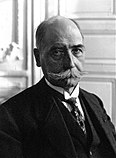
The Liberal Party was one of the two major parties in the United Kingdom with the opposing Conservative Party in the 19th and early 20th centuries. The party arose from an alliance of Whigs and free trade Peelites and Radicals favourable to the ideals of the American and French Revolutions in the 1850s. By the end of the 19th century, it had formed four governments under William Gladstone. Despite being divided over the issue of Irish Home Rule, the party returned to government in 1905 and then won a landslide victory in the following year's general election.
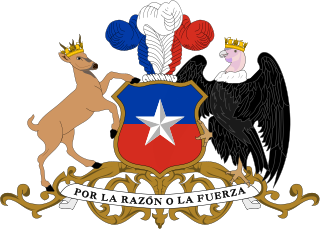
Chile's government is a representative democratic republic, whereby the President of Chile is both head of state and head of government, and of a formal multi-party system. Executive power is exercised by the president and his or her gabinet. Legislative power is vested in both the government and the two chambers of the National Congress. The judiciary is independent of the executive and the legislature of Chile. The Constitution of Chile was approved in a national plebiscite in September 1980, under the military government of Augusto Pinochet. It entered into force in March 1981. After Pinochet left power in 1988, saying this country was ready to keep going along with a plebiscite, the Constitution was amended to ease provisions for future amendments to the Constitution. In September 2005, President Ricardo Lagos signed into law several constitutional amendments passed by Congress. These include eliminating the positions of appointed senators and senators for life, granting the President authority to remove the commanders-in-chief of the armed forces, and reducing the presidential term from six to four years while also disabling immediate re-election. The Economist Intelligence Unit has rated Chile as "flawed democracy" in 2016.

Eugène Henri Brisson was a French statesman, Prime Minister of France for a period in 1885-1886 and again in 1898.

René Goblet was a French politician, Prime Minister of France for a period in 1886–1887.

Léon Victor Auguste Bourgeois was a French statesman. His ideas influenced the Radical Party regarding a wide range of issues. He promoted progressive taxation such as progressive income taxes and social insurance schemes, along with economic equality, expanded educational opportunities, and cooperative solidarism. In foreign policy, he called for a strong League of Nations, and the maintenance of peace through compulsory arbitration, controlled disarmament, economic sanctions, and perhaps an international military force.

Philip Snowden, 1st Viscount Snowden, PC was a British politician. A strong speaker, he became popular in trade union circles for his denunciation of capitalism as unethical and his promise of a socialist utopia. He was the first Labour Chancellor of the Exchequer, a position he held in 1924 and again between 1929 and 1931. He broke with Labour policy in 1931, and was expelled from the party and excoriated as a turncoat, as the Party was overwhelmingly crushed that year by the National Government coalition that Snowden supported. He was succeeded as Chancellor by Neville Chamberlain.

The Free Democratic Party or Radical Democratic Party was a liberal political party in Switzerland. Formerly one of the major parties in Switzerland, on 1 January 2009 it merged with the Liberal Party of Switzerland to form FDP.The Liberals.

The Radical-Socialist and Radical Republican Party was a liberal and social-liberal political party in France. It was also often referred to simply as the Radical Party, or to prevent confusion with other French Radical parties as the Parti radical valoisien, abbreviated to Rad, PR, or PRV.
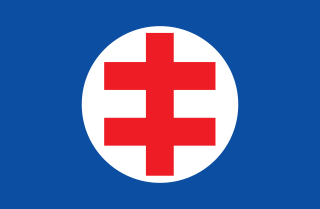
Hlinka's Slovak People's Party, also known as simply the Slovak People's Party or the Hlinka Party, was a right-wing conservative political party in Slovakia with strong Christian and nationalist orientation. Its members were called Ľudaks.
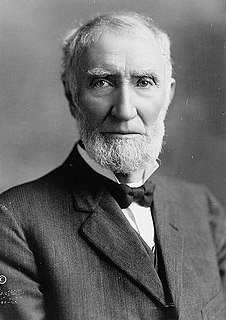
Elections to the United States House of Representatives in 1906 were held for members of the 60th Congress, in the middle of President Theodore Roosevelt's second term.
Events from the year 1906 in France.
The Lefts Bloc was a coalition of Republican political forces created during the French Third Republic in 1899 to contest the 1902 legislative elections. It initially supported Emile Combes's cabinet, then Maurice Rouvier's cabinet and finally Maurice Rouvier's cabinet. The Republican Coalition dissolved itself after the International Socialist Congress of Amsterdam of 1904 and the subsequent withdrawal of Socialist ministers from the government. Although the Left won the 1906 legislative election, the Socialists did not repeat their alliances with the Radicals and the Radical-Socialists and other Republican forces.

Pierre Emmanuel Tirard was a French politician.
The Hanley by-election, 1912 was a by-election held for the British House of Commons constituency of Hanley on 13 July 1912.
Waimea was a parliamentary electorate in the Nelson Province of New Zealand, from 1853 to 1887.
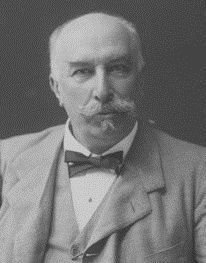
General elections were held in Italy on 7 March 1909, with a second round of voting on 14 March. The "ministerial" left-wing bloc remained the largest in Parliament, winning 329 of the 508 seats.
The Eifion by-election of 1906 was held on 5 June 1906. The by-election was held due to the resignation of the incumbent Liberal MP, John Bryn Roberts. It was won by the Liberal candidate Ellis William Davies, to become a County Court judge.
Parliamentary elections were held in Serbia on 11 June 1906. The result was a victory for the People's Radical Party, which won 91 of the 160 seats. Nikola Pašić remained Prime Minister.




